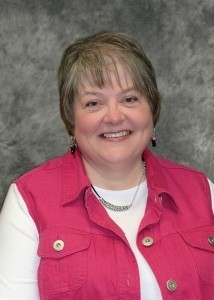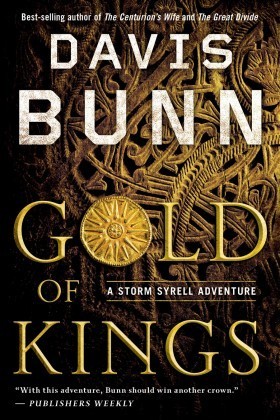Davis Bunn's Blog, page 46
March 9, 2011
Reader Takes 'A Short Judean Vacation' With the Acts of Faith Series

I love excellent fiction; don't you? If one book by an author is compelling as well as entertaining, I'm going to read them again. I started reading Janette Oke a long time ago when she was almost the only writer of Christian fiction on the shelves. I haven't missed a Davis Bunn book since 1993. When the two teamed up to combine their talents, I was curious. Now, I'm hooked.
When I settled in with my free Kindle copy of The Centurion's Wife, it was a cold winter day here in Minnesota. I tend to get personally involved in fiction, so welcomed the opportunity to imagine visiting a much warmer client and meeting pretend characters who might entertain me. They immediately became more to me.
Leah and Alban's relationship and interest in the missing prophet, Jesus, drew me in. Not since Francine Rivers' series, The Mark of the Lion, have I felt like I had warm, fine sand between my toes as book one in The Acts of Faith Series.
When I completed book one, I purchased books two and three. My recent lunch hours have been spent eating a quickly prepared sandwich so I could return to the land of my Lord Jesus for at least thirty minutes each day. Reluctantly, I'd shut down my reader and carry my empty plate to the dishwasher promising myself a few minutes to read later.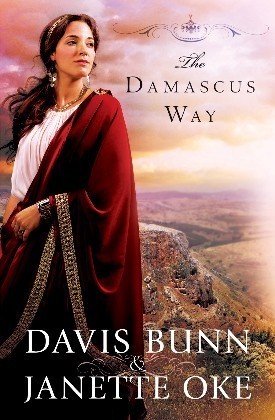
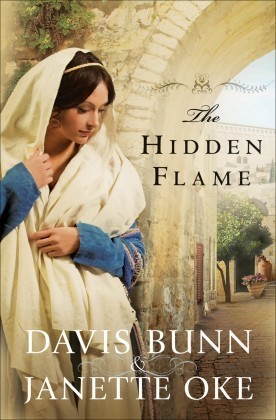
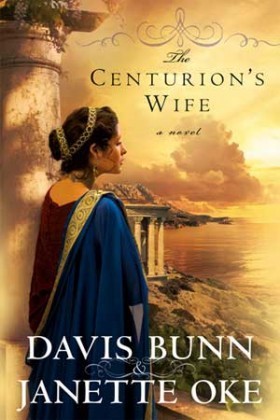
My connection to Abigail, heroine of The Hidden Flame, was immediate. I came to Christ at the age of fifteen, and like this character wanted to do all I could to serve Him well – including marrying a believer. Abigail captivates two men – neither of them followers of the Way. While both vie for her attention and her hand, leaving her spirit deeply unsettled. When a potential alternative solution presents itself Abigail realizes God answers her prayers too. I loved "meeting" Stephen and cringed at the power and piety of Saul of Tarsus. One of the best parts of this book was I got to spend some pretend time with one of my favorite biblical women – the one and only Martha.
I read the last page of book two and opened up The Damascus Way, intentionally taking a long lunch so I could "stay" in Judea just a little bit longer. The temperatures outside here were below zero, the wind howled around our house and I knew I'd made the right decision. Besides, and I wanted more time with the followers of Jesus.
Can a "kept" woman be redeemed? Can her daughter find something to replace the shame she feels for her mother and at times, herself? Julia learns with Jesus all this and more are possible for the woman who believes. I enjoyed getting to know Jacob better, getting back into Abigail's life, was delighted by the shining star, her daughter Dorcas, who looked surprisingly like my great niece Grace in my mind.
I was glad to meet Helena, Jamal, and the others, but it was Zoe the older servant whose wisdom and faithful heart meant the most to me in this third book of the series. She reminded me of my mom. Jacob's wild ride across the desert from blood thirsty bandits made my heart beat faster and I confess, I wanted to pray for him! (Did I mention I get a little involved in the fiction I read?)
I was thankful for the well-written conversion of Saul on the road to Damascus, and gained greater understanding of the mistrust these believers must have felt toward this Christian killer. God forgave him for much and so did those whose lives he had ripped apart in his religious zeal.
As I shut down my Kindle after the last page, I wondered if the authors would continue the stories – would they follow Paul to Lydia's house, into his tent making business, or the shipwreck? A reader can hope.
These two authors' voices blend seamlessly. The conflict and resolution flowed with rhythm and grace. I had time to take a breath, and when I left I wanted to hurry back. While these books are fiction, they remained true to the facts we know biblically and historically.
Bunn and Oke created characters who could have lived then – characters who reminded me of those first days when I became a follower of Jesus – with a hunger for others to know the One who is the Way, the Truth, and the Life.
If you haven't read this series yet, I encourage – even urge you to do so. If you can, purchase all three at once and read them one right after the other for a short Judean vacation from the comfort and safety of your own chair.
Joy DeKok is an author, speaker, and author coach. One of Joy's favorite things to do is reading fiction curled up in a comfy chair in the winter and outside in her gazebo the rest of the year. She and her husband Jon live on 35 acres of woods and field in rural Minnesota. They find great pleasure riding their John Deere Gator to their bog where they can listen to the bull frog choir, watch the birds, drink hot coffee, and hold hands. Visit Joy at Author Infusion.






March 7, 2011
Character Sketches for Acts of Faith Series

 By Laura Christianson
By Laura Christianson
Guest columnist
When I read a series, I sometimes feel overwhelmed by the vast array of characters who populate the pages. The Acts of Faith series was a pleasant surprise, because several characters play key roles in all three books.
I read The Centurion's Wife, The Hidden Flame, and The Damascus Way back-to-back-to-back, which I highly recommend, because each succeeding book begins where the last one left off. And while there are a lot of characters, Davis Bunn and Janette Oke weave them in naturally and give us time to get to know each character.
I created a "cheat sheet" to help me keep track of the characters in the Acts of Faith series, and I thought I'd share it with you. Don't worry; my character sketches don't include any plot spoilers.
I will give you one hint about the theme. In my opinion, the premise for all three books is: What if you discover the truth about Jesus, and the truth shatters your life?
Now, on to the character sketches!
* Indicates characters who appear in all three books
The Centurion's Wife
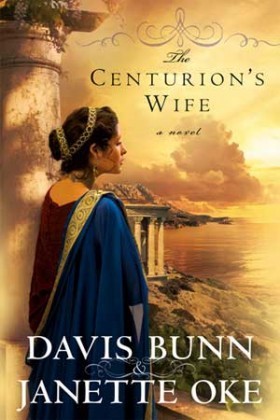
A.D. 33, in Caesarea, Judea province and Jerusalem
The action takes place immediately following Jesus' crucifixion, during the 50 days between Passover and Shavuot, or Pentecost.
Key characters
Leah, age 19
Originally from Verona, Leah had been born to wealth and position. But a because of a financial calamity in her family, Leah now serves as maid for Pontius Pilate's wife, Procula.
*Alban, age 24, a centurion
Alban commands one of Judea province's outermost garrisons. The son of a chief in Gaul, Alban is described as "a foreigner who has managed to rise to the rank of centurion." Alban is not only a fierce warrior, but he is also a kind, skillful leader who is respected by his men.
*Jacob, age 12
Alban's favored servant.
*Linux Aurelius, Pilate's aide
A handsome, bold Roman officer, Linux is an aristocrat born in Umbria (northern Italy), who serves as Pilate's official messenger.
Herod Antipas, Tetrarch of Galilee and Perea
Herod (along with the high priest, the Sanhedrin, and Pilate) believes that the Roman power structure is in danger from fanatics who claim the carpenter's son, Jesus, is their Messiah. He says to Pilate, "They are out to destroy us. If they can stir up a large enough rebellion, we will both suffer for it."
Pontius Pilate, Governor of Judea
Pilate lives in an opulent palace in Caesarea, and at the beginning of the book, he is leaving for Jerusalem, where he'll be in charge of maintaining the peace during the annual Passover festival. Pilate orders Alban to infiltrate the ranks of followers of the prophet Jesus to learn whether there is a threat against Pilate or against Rome.
Claudia Procula, Pontius Pilate's wife, Roman royalty
Plagued by nightmares and headaches, Procula commissions her servant, Leah, to inquire on her behalf about the followers of the prophet, Jesus.
*Abigail, a young Judean follower of Jesus
*Martha, sister of Lazarus and Mary and stalwart servant of the Lord Jesus.
The Hidden Flame
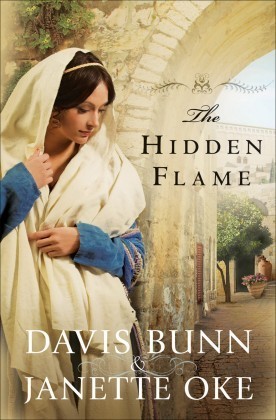
A.D. 33, Jerusalem
The action begins immediately after The Centurion's Wife ends, six weeks after Jesus's crucifixion. In Chapter 2, we jump forward 25 months.
In the midst of great political unrest, followers of the Way live in fear, but simultaneously seek God's will. The themes in this novel resonate as deeply in the 21st century as they did in the first century.
Key characters
*Abigail, Linux, Alban, Jacob, and Martha from The Centurion's Wife
Stephen, a young man and follower of the Way
Born a slave to a Greek, Stephen received his freedom as a gift when his master died. He serves the risen Lord with a quiet passion.
Ezra, a senior merchant
A widower with two children, ages 4 and 6, Ezra's trading empire stretches from Jerusalem to Damascus and Rome.
Sapphira, Ezra's youngest sister
Wife to Ananias, Sapphira married into a family of Jerusalem merchants. She is a follower of Jesus.
Gamaliel, elder Pharisee who serves on the Sanhedrin, the Temple Council
Long-time mentor to Ezra, Gamaliel is a perceptive listener and a mediator.
Enos, personal aide to Herod Antipas
Head of the palace staff, Enos is a greedy man, not to be trusted.
Peter, a disciple of Jesus
Marcellus, new governor of Judea (after Pontius Pilate)
A man shaped by idleness and indulgence, Marcellus is angling for the position of consul of Rome (an extremely powerful political position, one who acts as a bridge between the emperor and the Senate).
The Damascus Way
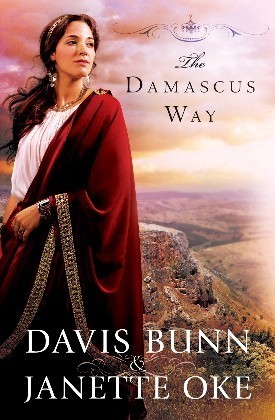
Circa A.D. 40
The story takes place mainly in Tiberias, the Samaritan Plains, and the Megiddo Plains.
It is no longer safe to be a follower of the Way. Spies are everywhere and charges of misconduct – religious and otherwise – are leveled daily against those in the community. As a result, people who trust in the risen Jesus are dispersing from Jerusalem. As they attempt to forge new lives in unfamiliar places, they learn to listen to God's voice, lean on God's protection, and trust God amidst life's uncertainly.
The core question this book addresses is: How can I live so that when someone sees me, they are pointed to Jesus?
Key characters
*Jacob (now 20 years old), Abigail, Martha, Linux, and Alban from the first two books.
Julia, a young woman, daughter of the wealthy merchant, Jamal
Jamal, a Syrian trader and merchant of Greek lineage
Julia's father, Jamal, owns a large caravan and the trading grounds outside Tiberias. He is away from home many months at a time, dividing his time between Tiberius and Damascus.
Helena, Julia's mother, a Samaritan
Zoe, Helena and Julia's beloved servant, a follower of the Way
Saul of Tarsus, a young Pharisee
Tall, lean, and hard, Saul is a religious version of a bird of prey. Certain of his authority, Saul will sentence any man who opposes him to death.
Philip the evangelist
An educated, quiet man and one of Jesus' disciples, Philip is highly respected among followers of the Way for his passion and dedication.
Dorcas, age 4, Abigail's daughter
Cornelius, senior centurion within the Italian Guard
The Italian Guard is the preeminent brigade in Judea and is staffed by Rome's elite.
Yelban, village elder in Nain and at the market in Megiddo. Tavern owner.
Helzebah, a woman from Sychar
In the Bible, Helzebah is the Samaritan woman at the well whom Jesus met. Her witness is responsible for entire villages becoming believers.
Simon, a wizard who lives in Nain
A famous wizard, Simon is known throughout Samaria. In the Bible, you'll find his story in Acts 8:9.
Laura Christianson manages Davis Bunn's blog. The author of three non-fiction books, Laura owns Blogging Bistro, a company that helps businesses and individuals enhance their Internet presence.






March 4, 2011
Storm Syrrell Adventures Fascinating Stories for History Buffs, says Reader

Gold of Kings was a fascinating story! And I loved the video clip you made with Bob Marx. I am a history buff so I really enjoyed seeing a glimpse of Harry Bennett's treasures. Absolutely amazing!
Thanks so much for sharing this insight into the story development of Gold of Kings. I have been enjoying your writing for many years and have a pretty decent Davis Bunn collection in my home library. You are an amazing writer…or is author the correct word here?
My Response:
Thanks so much, Margie. Bob Marx has been ailing for the past few months, heart problems. It really was great to be able to shoot this video clip with him while he was still full of spit and vinegar. So glad you enjoyed it.
There is an unspoken desire by most serious novelists to be considered artists whose pallet is made up of words, descriptions, dialogue, characters, and well crafted images. Both author and writer work, in my opinion.
When Will Storm Syrrell Return?
Nancy writes:
I have enjoyed your books for many years and look forward to your upcoming Lion of Babylon. My favorites are the international drama/intrigue books so I was wondering, hoping you were planning to write a book #3 for the Storm Syrrell series.
You really left me hanging in the last one. Thanks for providing such a wonderful escape from daily life – even if only occasionally. The books require total concentration allowing me to block out other worries for a while.
My Response
Thanks so much for your lovely note. I am in the process of completing the major edits on Lion of Babylon, and receiving this message of enthusiasm and praise has really given me a lift.
There is definitely going to be more tales in the Storm Syrrell series, but it will be a while. Because of a project that's really gotten some buzz around Howard (my publishing company), and because of a film project I'm working on, Storm is going to be sitting on the sidelines for at least a year, possibly two.






March 2, 2011
'The Meeting Place' Fresh and Vibrant Across the Years, Says Reviewer

 Today I welcome guest reviewer, Casey Herringshaw, who is reading The Meeting Place, one of the first novels Janette Oke and I co-authored. She says, " This is the third time I have read the book and it holds just as much joy now as it did then."
Today I welcome guest reviewer, Casey Herringshaw, who is reading The Meeting Place, one of the first novels Janette Oke and I co-authored. She says, " This is the third time I have read the book and it holds just as much joy now as it did then."
By Casey Herringshaw
Guest Reviewer
It's the third time I have picked up The Meeting Place (Song of Acadia #1) by the talented duo of Davis Bunn and Janette Oke and it's like I've never read it before. The story remains fresh and vibrant across the years since it was first published to just last night when I closed the cover on the final page.
by the talented duo of Davis Bunn and Janette Oke and it's like I've never read it before. The story remains fresh and vibrant across the years since it was first published to just last night when I closed the cover on the final page.
Every good story is about a relationship, a love story. Not a romance, but love. Love between friends, child and parent, a husband and wife, a love for country. The Meeting Place has this and so much more. I am always drawn in by the depth of research that must have gone into this book. The landscape becomes another character, especially the meadow where Louise and Catherine meet.
The characters in their actions, their struggles and their determination against a time that must have felt every bit as uncertain as our own, makes them extremely endearing to me. Which I think is one of the reasons I love this book — it doesn't matter that it was based three hundred years ago. It could have happened today and I can only hope to face such trials with the grace of the Robichauds and Harrows.
It goes without saying that this book has more than impact, it has spirit, valor, heart-wrenching moments, moments of forgiveness and crossing boundaries no one would have thought passable.
It is a story that retains its freshness and beauty long after the final page has been turned. What else could you expect from such a talented writing team?
 Casey Herringshaw is a homeschool graduate and has been writing since high school. She lives in rural Eastern Oregon in a town more densely populated with cows than people. Taking the words and stories God has placed on her heart and putting them on paper is one of her highest passions in life. Casey is a member of ACFW. You can connect with her through her personal blog, Writing for Christ and her writing related group blog, The Writer's Alley.
Casey Herringshaw is a homeschool graduate and has been writing since high school. She lives in rural Eastern Oregon in a town more densely populated with cows than people. Taking the words and stories God has placed on her heart and putting them on paper is one of her highest passions in life. Casey is a member of ACFW. You can connect with her through her personal blog, Writing for Christ and her writing related group blog, The Writer's Alley.






February 28, 2011
Striving for Excellence (Davis Bunn video)

Many of you ask how I became a novelist, particularly considering my former life as a hard-driving businessman who traveled to up to four countries every week.
During this keynote address in Nairobi, Kenya, I explain how I wrote for nine years and finished seven novels before selling my first book. I talk about the forces that sought to lure me away from my faith and from writing, and how the discipline I learned during that time fueled my growth in the Spirit.
Please comment and let me know how the video impacts you.






February 25, 2011
Try The Sketching Technique for Novel Writing

Elizabeth writes:
I really enjoyed reading your recent blog post describing a bit about your daily routine – and was especially intrigued by your notion of "sketching" one day preparatory to writing another day. That sounds like a good plan for helping creativity to "flow" – with pen and keyboard as well as pencil.
My Response:
Yes, the sketching is often a vital component of regular output. It gives me a chance to try on certain scenes for size and fit, as well as maintain a clear emotional thread from beginning to end of the story.






February 23, 2011
Police Officers in Fiction: Bad Cop, Bad Cop?

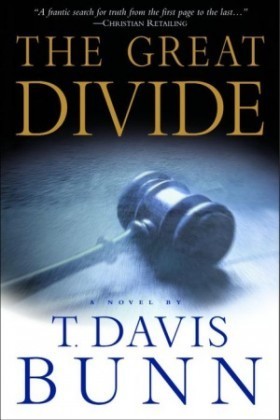 The following wonderful (and most reassuring) note comes from Mark, in response to Laurie's criticism of how I portrayed police officers in The Great Divide:
The following wonderful (and most reassuring) note comes from Mark, in response to Laurie's criticism of how I portrayed police officers in The Great Divide:
Laurie, I appreciate your view point since I was a police officer for 26 years. The portrayal of bad cops in fiction has become almost routine, a characterization that allows writers to develop conflict without much effort. However, I find Davis Bunn's characters very balanced and realistic. He does a great job of creating his characters with all their human frailties and mistakes without stepping over that line. His novels, THE GREAT DIVIDE and WINNER TAKE ALL, are among my favorite.
Let's face it. In the real world of law enforcement there are a few bad apples out there who reflect poorly on all those good officers. But these bad apples are few in number, as should be the fictionalized bad cops we read about. We are all very human. At times,even well-meaning humans make mistakes because of the frailty of their nature. Sometimes they lose sight of who they are and what they are supposed to be doing. Good fiction should capture these moments without exploiting them.
That being said, I appreciate all those in law enforcement out there who are trying to do a very difficult and challenging job. May God protect your sons, Laurie, as they do His work.






February 21, 2011
Readers Comment on Acts of Faith Series

I just began reading The Centurion's Wif e. It struck a chord because I've been working on my own novel, which includes some of the same historical characters used in The Centurion's Wife.
My version of the centurion is quite different from yours, and I have some concerns about that. Were you able to find actual historical accounts of the centurion that provided his name or his origins in Gaul? Though I spent some effort searching, I was unable to find out anything about this man that is not in Scripture. Claudia/Procles/Procula (Pilate's wife) on the other hand, seems to have at least a few legends and historical accounts beyond Scripture.
My Reponse:
No, there is nothing whatsoever directly related to the Centurion's background, not as legend nor as historical commentary. What we do know, and this is verified record, is that by the time of Jesus' birth almost all the Roman soldiers based in Judea were from the outer provinces. Most were either conscripted at a very early age, or sold, or volunteered after their own armies were defeated. They were warriors. They knew no other life.
As for Procula, there is a great deal more on offer. I would urge you to read a truly remarkable biography entitled Pontius Pilate, by Anne Wroe (Doubleday), a finalist for the Pulitzer. It deals mostly with legend, as that is all we have, but there are several crucial links made to recent archeological finds.
Dorothea writes:
Thank you for writing The Centurion's Wife and The Hidden Flame. I enjoyed both books, and I'm about to read The Damascus Way. This is a wonderful series that brings the early church to life.
Judy writes:
Just finished The Damascus Way. So enjoyable. There was a great deal of research that went into this book. There is something about your books that goes beyond enjoyment that I look for.
Sarah writes:
Your books make me think…they go deep. I can't explain it. When I thought of the character Jamal in The Damascus Way I thought of my own Dad. He isn't a believer and only recently has shown interest. Do pray for him if you will. His name is Cork… Keep writing and stay close to the Lord in these trying times. We have an awesome God.
My Response:
It was so very touching to hear of this connection you made between my characters and your father. This was specifically what Janette Oke was after when she came up with this idea.
We wanted to get away from an inspirational book where all the characters were either of faith or moving in this direction.
Life then, and now, was very different for a lot of families. I do hope and pray that this seismic shift and re-orientation happens in your father's life.
**Note: You can download a free copy of The Centurion's Wife (Book 1 in the series) to either your Kindle or Nook for a limited time.






February 18, 2011
What This Means for Us: First-Century Power Players, Part 10

To help you better understand the historical-cultural context of the Acts of Faith series (The Centurion's Wife, The Hidden Flame, and The Damascus Way), I'd like to introduce you to the primary Judean authorities at the early part of Acts. This is Part 10 of 10.
What This Means for Us
Our Lord was absolute master of the universal message. What he said to these groups two thousand years ago has equal and profound importance to us today.
The hunger for the Lord's return is as real today as it was twenty-one centuries ago. Yet Jesus based his Kingdom message around one simple fact: Our hope is found not in yearning for an other-worldly tomorrow but in drawing near today.
Jesus acknowledges that of course we long for his return. Yet his teachings on the kingdom of heaven relate to God's presence in the here and now. Jesus sought to realign the disciples' attention away from two false expectations: First, that God's Son would overthrow their oppressors with sword and bloodshed, and second, that the Kingdom's arrival was to be a future event. Jesus repeatedly instructs his followers to focus upon drawing nearer to God now.
The reason for this is starkly simple. Tomorrow never comes.
When Jesus began his ministry there was a great passion for the end times. They were oppressed. They were servants and slaves and beggars in their own land. They did not control their destiny. Their masters were godless, scornful, oppressive, cruel, uncaring. The times Daniel described and Isaiah predicted had to be drawing near.
Yet when the answer came in the form of the living Savior, he overturned their doctrine with the same force as he did the Sadducees' money carts. Do not concern yourself with the timing of future divine events. Forget these discussions about tomorrow. Stop obsessing over future signs. Because the Kingdom is here. The Kingdom is now.
By setting our sights upon some future day, some distant hour when the heavens split open and all our problems vanish in the blink of a divine eye, we miss a vital point. Jesus wants us to find him where we are. In the dust of this hard road, he is. In the pain of earthly existence, he dwells. His kingdom is now.
By seeking an intimate walk with Jesus through his Holy Spirit, by seeking the kingdom in this very hour, we open ourselves to a festival moment.
Our quest should be to find him in the here and the now.
Not tomorrow.
Not when our pain is gone.
Not when life is easy.
Now.
Here are links to each of the books in the Acts of Faith Series. I believe it will enhance your understanding of first-century power players to read the novels as you work your way through this series.
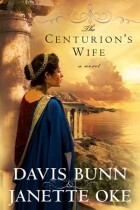
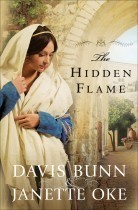
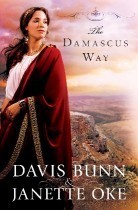
To make sure you receive every article in this 10-part series, please subscribe to my blog via e-mail or your feed reader by clicking this link: http://feeds.feedburner.com/DavisBunn






February 17, 2011
Back to the Pharisees: First-Century Power Players, Part 9

To help you better understand the historical-cultural context of the Acts of Faith series (The Centurion's Wife, The Hidden Flame, and The Damascus Way), I'd like to introduce you to the primary Judean authorities at the early part of Acts. This is Part 9 of 10.
Back to the Pharisees
The Hebrew word for Pharisee is Pirush and means an interpretation.
In Matthew 15 these Perushim come to Jesus and demand to know why his disciples violate the tradition of the elders, referring to the body of teachings developed around the Torah, the first five books of the Bible. Today these teachings take up a vital portion of the Talmud, the rabbinical teachings, and are referred to as the Mishnah.
The Pharisees based their life upon these interpretations. And here is the vital key to understanding their response to Jesus: They did not see these as interpretations at all. The Pharisees considered them to be divine revelations, holding the same authority and authenticity as the sacred texts themselves.
This view of Scripture still holds among the religious Jews of today. Orthodox Jews consider the Talmud on par with the Torah. The Talmud is the key to understanding the Scriptures, they believe, and without the Talmud right thinking is not possible.
So when Jesus responded with new interpretations, when he dared to correct their thinking, when he rebuked them for making their interpretations into stumbling blocks for the common man, they were absolutely consumed with rage.
But their rage over Jesus' teachings goes even deeper. So deep, in fact, that they were willing to establish a union with their avowed enemies. Two groups that hated and fought each other for centuries now united to ensure the death by crucifixion of one man.
Remember, the Sadducees said there is nothing beyond death. The kingdom of heaven? Then build it here on earth. Live a moral life. Follow God's law today. Because today is all there is.
In contrast the Pharisees lived for God's return in the Messiah. They studied the prophetic end-time texts and argued over the smallest scrap of detail. The earthly realm was of little or no importance.
Jesus came and told them they were both wrong.
The Sadducees heard him speak of heaven with personal intimacy, as one who had only recently arrived from there. He rebuked the Pharisees for both misunderstanding the concept of the kingdom of heaven and becoming so obsessed with the end times they lost sight of the suffering that surrounded them
And so these two factions conspired to murder him. What choice did they have?
There was a man named Nicodemus who was one of the Pharisees and an important Jewish leader. One night Nicodemus came to Jesus and said, "Teacher, we know you are a teacher sent from God . . ." John 3:1-2 ncv
Nicodemus was not the sole member of the Sanhedrin to follow Jesus. But he was certainly in the minority. The other council member we know of who shared his devotion was Joseph of Arimithea, the man who played a vital role in Jesus' burial. Joseph was a Pharisee like Nicodemus. We know this because the Scriptures tell us that Joseph was "waiting for the kingdom." That single descriptive phrase tells us a great deal, since the Sadducees did not believe in the hereafter.
Rabbinical sources indicate that Nicodemus was an extremely rich man. He gave his sister a million gold dinars for her dowry. His niece received four hundred dinars a month just for perfume. But he was also a curious man, so driven by his hunger to know more about this prophet that he would risk everything to speak directly with Jesus.
This exchange comes very early in Jesus' ministry. Which means the Pharisees had heard of him, and one of their own traveled out into the provinces to speak with him.
Travel from Capernaum to Jerusalem required one week. What is more, the Sanhedrin rarely stepped foot out of Jerusalem. The official limit of their power base was Judea, and Capernaum was much further north, beyond Samaria, up near the borders of the Syrian province and the Parthian empire. Yet this wealthy, powerful man came to Jesus. And what he says here is more than astonishing. "We know you are a teacher sent by God." A truly amazing statement.
Nicodemus has effectively admitted that the ruling council recognizes Jesus as holding divine authority. The Sanhedrin knows by what Jesus is doing, and because of his moral conduct, that he truly is a man of God. Yet the majority of this council chooses to reject him.
Jesus said, "You are an important teacher in Israel, and you don't understand these things?" John 3:10 ncv
The oldest known Greek texts of John's gospel state that Jesus calls Nicodemus the teacher of Israel. That indicates the highest teacher. We know that the Sadducees controlled both the Temple and the ruling council. But their connection to the common man was virtually nil. They did not bother to teach anyone outside their very limited circle. What this suggests is that Nicodemus was the most powerful Pharisee on the Sanhedrin, their senior scribe. This makes the exchange between Jesus and Nicodemus all the more remarkable.
Nicodemus has asked Jesus to explain the second birth. He chides this man for not understanding. This is a vital point for us.
"I tell you the truth, unless you are born from water and the Spirit, you cannot enter God's kingdom. Human life comes from human parents, but spiritual life comes from the Spirit. Don't be surprised when I tell you, 'You must be born again.' The wind blows where it wants to and you hear the sound of it, but you don't know where the wind comes from or where it is going. It is the same with every person who is born from the Spirit." John 3:5-8 ncv
Nicodemus would have fully accepted the concept of immersion. As a matter of fact, he practiced it himself. As is commanded in Leviticus and elsewhere, devout Jews visited the ritual baths at least once a week. I recently went to one such bath in Svat, a city in the hills between Galilee and the Lebanese border, that has been in use for over twenty-five centuries. So it was not the concept of immersion that was alien to Nicodemus, it was the purpose.
In this passage, Jesus ties together the truth of baptism to receiving the Holy Spirit. Our learned man would have been deeply conflicted. On the one hand, such immersions would have been a natural component of participating in any major festival. And these festivals, at least in their biblical form, were intended to draw man closer to God.
Yet Jesus suggests here that when a person enters the water and is born anew into God, the Spirit also enters in.
Nicodemus would have known about the Spirit. The Holy Spirit is mentioned throughout the Old Testament, beginning with his presence above the waters in Genesis one. The texts Nicodemus knew inside and out were interpreted to mean the Holy Spirit appeared only to God's chosen messengers. Now Jesus was saying that this intimacy, this divine indwelling, was available to all believers.
Here are links to each of the books in the Acts of Faith Series. I believe it will enhance your understanding of first-century power players to read the novels as we progress through this series.



To make sure you receive every article in this 10-part series, please subscribe to my blog via e-mail or your feed reader by clicking this link: http://feeds.feedburner.com/DavisBunn
Coming next: What this means for us







